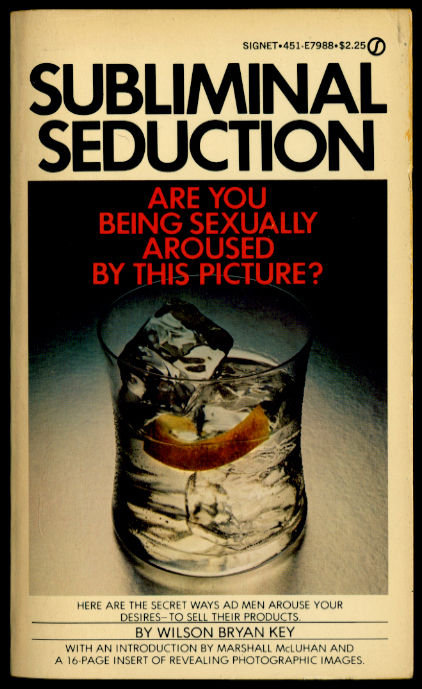I haven’t been able to decide what to write about, so I just picked one of the “Working Questions.” There’s one at the end of the Subjectivity chapter that asks something like: Most of us would agree that advertisements have relatively little effect on our decisions, so why do advertisers advertise? This reminded me of Stanley Kubrick’s movie, The Shining. I didn’t like the movie all that much when I first saw it, and I was ashamed, because, like, everybody does. So I looked started doing a little research on it to see why it’s so good–and some pretty cool stuff popped up.
Evidently Kubrick had been obsessing over this book at the time before he was working on The Shining, this book about subliminal messages and advertising called, Subliminal Seduction, by Wilson Key.
Turns out there’s a lot of theories about what’s really going on in The Shining–people have been identifying some suspect subliminal ques that seem to point towards some strange stuff. There are a lot of examples but I’ll just go into one of them. You’ve probably heard in one way or another some conspiracy about how the Apollo moon landing footage was fake. Well, okay, yeah right, who knows. But if the footage was fake, it would have had to been faked by somebody was damn good at making things that aren’t real look real, especially in 1969. Somebody like, say, Stanley Kubrick. There is more people than you might think who believe he was the one who faked the footage.
And they use The Shining as evidence: 
That’s a picture of Danny wearing his apollo 11 sweater, and of the haunted Room 237 (the moon is like 237 thousand-ish miles from the earth).
I think the whole thing is a bit ridiculous, but hopefully this extends the conversation about advertisements in general. I mean, of course we don’t see a commercial and run out and by the product right away, but maybe the effect is more subliminal, and our impressions from the advertisements stick with us in a subconscious sort of way.
Another way to put this is that ads don’t often make directly arguments: like this product will do X and Y for you, and you need X and Y, so go buy the product. Instead, they make broader claims on things we like to think we values–freedom, leisure, uniqueness, etc. We want to buy products that we associate with certain values, or certain kinds of people. In a way, they play upon our desire for timeless and transcendent truths, our desire for transcendental signifieds that will give our life some guaranteed meaning or significance. To be critically aware of such ads is to interrogate the distance there often is between those lofty claims and actual use of the product. In other words, we take the metaphorical meaning (car = happiness) and bring it back down to the level of material signifiers: whose happiness? in what way? how long will it last?
Kubrik is a roundabout way to get there, but I guess the example shows the dangers of over-interpretation. There are facts–especially historical ones. The Holocaust happened; someone landed on the moon; yesterday was a Saturday. We do have some stability.